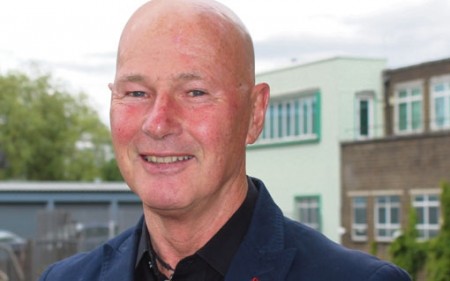IT’S no surprise that Father Bernàrd Lynch’s life fills not one but three Channel 4 documentaries. Nicknamed by newspapers “The Aids Priest”, Bernàrd, 67, spent almost four decades ministering to people with HIV and Aids in America and the UK. Based in Camden since 1992, he chairs the Camden LGBT Forum and the London Irish LGBT Network.

“Camden Town reminded me of New York – Greenwich Village and the East Village. It had all that bohemianism and artistic edge,” he says. “I’m at home here because it is truly catholic in the secular sense of the word.”
Bernàrd has publicly railed against inequalities in the Catholic Church and society. As an openly married gay man, the Church revoked his licence in 1989 yet he continues to perform mass at the behest of parish priests and works as a psychotherapist. A handsome, softly spoken man, the only outward symbol of his faith is the Celtic sign of hope he wears on a chain, subtly bringing it up to his lips at the mention of the gospel.
“I prefer to be called Bernàrd but I don’t make an issue of it,” he says. “As a priest, like a doctor or all caring professions, people come with all kinds of expectations, and some people need to call me ‘Father’ because that is the kind of relationship they want and that’s OK but it’s not my choice.”
The lightning speed at which Aids ravaged communities in the 1980s has already been relegated to history; the misinformation, the rumours, slurs and prejudice somehow mislaid. “But I will never forget,” he says. “I read in First World War memoirs ‘how does one go back to bagging corn from being in the trenches?’ Well, I’m back bagging corn. No one knows and that’s part of the pain.”
It was sectarian violence in Northern Ireland that triggered Bernàrd ’s campaigning spirit. Aged 17, he began training in the African Missions college near Belfast. There he found a definite separation between the seminary and contemporary politics. “I didn’t start out as a radical or a rebel, anything but. I was radicalised by what I saw,” he says. “I happened to be in Northern Ireland for Bloody Sunday in 1972. The seminary was a very closed community but after seeing that massacre of 14 unarmed teenagers shot in the back they released us en masse to march against the atrocity and that was my first exposure to politics.”
Bernàrd cared for hundreds of men dying from Aids in New York. Time and time again he would encourage mothers to touch their sons. “It was incredible, the sense of contamination,” he says. “I was literally taking their hands and saying you cannot get it, it’s OK. And they would thank me like I had done a miracle.” A week later he could be officiating at the funeral, always introduced as “a friend of the family”.
He remembers working with Mother Theresa in New York. She and her sisters would not allow gay partners at patients deathbeds because they were “occasions of sin”.
“My own church blamed people for getting the disease. Can you think of anything more unchristian? A lot of Catholic men died in despair because of their church. At a time when the church should have been their hope, their way of easing them into their death, it became in fact the arbiter of hate.”
Yet Bernàrd’s faith stayed strong. He continues to separate his belief from the religion, distilling it into two words – “love and justice”.
Last month Bernàrd, with the London Irish LGBT Network, watched the results of the Irish marriage equality referendum at Ku Bar in Soho. It was a mixed crowd and though ecstatic at the overwhelming victory Bernàrd was moved by the stories he heard. Young men and women told how they had moved to London away from homophobic discrimination.
“I couldn’t delight more with the result and that isn’t anti-Catholic,” he says. “It’s good for the Church and that is certainly better for the Irish nation. The Church, in my mind, has no right to get into bed with anybody, that is not its business.”
Complete Article HERE!
